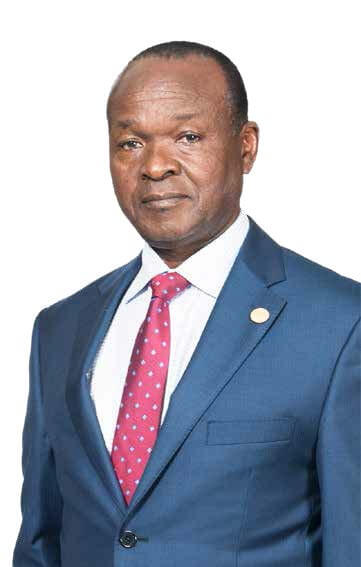The better part of the last two financial years have been marked by unprecedented global focus on COVID-19, the global pandemic that took the World by surprise. The numerous natural, economic, and intellectual resources that have been spent to contain the spread of the rapidly-mutating enigmatic disease, and to eradicate it, have been worthwhile.
In the Eastern Africa region for instance, conditions for external trade and investment have tremendously improved due to enhanced focus on trade as a key ingredient for economic resilience. This, I dare state, is a direct result of joint efforts by TradeMark Africa (TMA), the region’s Governments, donors and other partners, to accelerate innovative approaches to trade in the face of the COVID-19 pandemic. By the start of the 2020/2021 financial year, exports of most East African Community Partner States had surpassed their 2019 levels, whilst imports recovered to pre-pandemic levels, testimony of increased regional resilience.
At TMA, we strove to maintain progress and associated developmental gains generated over the years, that could have been easily reversed by the effects of the pandemic. In our commitment to make meaningful and resolute impact through inclusive and sustainable trade in the region, TMA intensified focus on innovation and digital transition, simultaneously with its expansion plan. Innovation and digital transition enabled markets and borders to safely remain open for continued trade, thus speeding up recovery and promoting traders’ resilience. This contrasts with other parts of the Continent whose trade continues to be affected by the pandemic.
The Safe Trade Emergency Facility (Safe Trade), TMA’s programmatic response to COVID-19, was developed to support Governments to mitigate the impact of the pandemic on trade. In line with other TMA programmes, Safe Trade is powered by a strong coalition of partners. National governments and agencies related to Health and Trade, Regional Bodies such as the East Africa Community (EAC), and Intergovernmental Authority on Development (IGAD), private sector associations, international bodies such as World Food Programme (WFP) and UN-OCHA, and donor agencies came together under the shared objective to tackle COVID-19 and reposition the region for recovery. Notably, Safe Trade interventions enabled TMA’s plan to expand to the Horn and the rest of Africa, which started in October 2018, to happen within Zambia, Mozambique, Malawi, Ethiopia, Djibouti and Somaliland.
Our annual $76.5 million budget was deployed across several thematic areas, such as efficient transportation and logistics, trade policy, women and trade, advocacy, and policies, digital trade, and digitisation of Government systems. We also accelerated programmes to support e-commerce, standards harmonisation, and commenced work on Sanitary Phytosanitary issues, and sustainable inclusive trade. We supported Governments to engage on trade reforms and adopt policies that support broad outcomes, especially as implementation of the Africa Continental Free Trade Area (AfCFTA) starts. Supporting Governments to adopt efficient trading systems by building stable and coherent processes, providing technical assistance, capacity building of institutions and private sectors has remained central to the success of our thematic focus. As COVID-19 abates and countries open up, we are more convinced that a global recovery can be built on inclusive trade, recognising that shocks have had significant effects on livelihoods.
TMA has made good progress on defining the feasibility planning for its new commercial arm that will aim to catalyse commercial capital into TMA’s infrastructure and digital workstreams. With promising support from TMA’s development partners, we anticipate this being established over the next year.
The Board acknowledges that all these achievements would not be possible without our staff’s commitment to TMA’s mission to accelerate prosperity in Africa through trade. Our management team managed to absorb 18% budget cuts due to the effects of the pandemic on aid budgets in donor countries. The staff’s dedication reflects organisational resilience that has been developed over the last 12 years, and the strong support for TMA’s mission and vision. I thank my fellow Board and Council members for their close engagement this year on supporting management.
In the face of the pandemic, African economies have not only demonstrated resilience and fortitude, but also identified opportunities for economic acceleration. I believe it is time to look beyond the pandemic, as Africa’s economic potential intensifies in the face of continued global economic recovery. Free trade, enshrined in the landmark Africa Continental Free Trade Agreement (AfCFTA) holds the much-needed stimulus for greater intra-African trade, and economic promise to reduce the Africa’s exposure to global disruptions. Finalising the outstanding negotiations will substantially help boost local manufacturing and productivity, particularly through the expansion and deepening of regional value chains.
Amb. Erastus Mwencha
Chair of the Board















